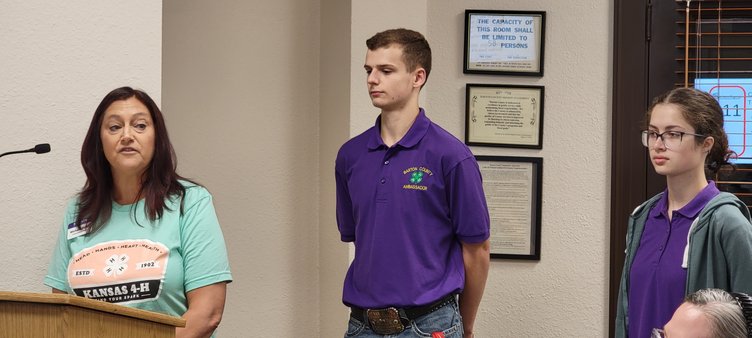The 4-H program has a significant positive impact on youth locally as well as nationally. To highlight this, the Barton County Commission Wednesday morning approved a proclamation denoting next week as National 4-H Week.
This year’s national theme is Opportunity 4 All.
Michelle Beran, youth development agent for the Cottonwood District, Barton County office, was joined by 4-H Ambassadors Ailey Williams and Parker Dicks in presenting the proclamation. 4-H, as delivered by area Cooperative Extension agencies, has helped thousands of youth become true leaders, entrepreneurs and visionaries, Beran said.
By declaring 4-H Week, “the commission encourages all citizens to recognize 4-H for the significant impact it makes by empowering youth with the skills they need to lead for a lifetime,” the proclamation reads.
“4-H offers more than 40 project areas from art to woodworking,” Williams said. “We usually think of livestock projects, but 4-H is so much more than cows and cookies.”
There are eight active clubs in Barton County, she said. There is one in Ellinwood, four in Great Bend, two in Hoisington, one in Odin and one in Claflin.
In 2022, there were over 120 youth members and 30 registered volunteers, she said. “Speaking of volunteers, we are always on the lookout for adults who are willing to interact, help with a project or model positive behaviors.”
“We have a great partnership with Barton County Fair Association,” Dicks said. “We had great entries at the county fair and Michelle just took about 70 entries that qualified for the Kansas State Fair.”
In order to qualify, youths must receive a purple at a county event. “So it is definitely a big deal for you to qualify,” he said.
In addition to the traditional fair entries, members can receive a purple ribbon at 4-H Club Day in February on their project talk demonstrations, illustrated talks or dramatic readings to qualify, Dicks said.
“There are also regional and state events that 4-H youth have access to,” Beran said. “In addition to traditional 4-H programs, I’ve had the opportunity this last year participate in Great Bend Reads, where all K-6 students at USD 428 received a copy of ‘Charlotte’s Web’ and participated in a variety of activities.”
These were very busy five days since she visited each grade school. “But it let me reach over 1,500 youth to talk about livestock, the fair, 4-H and Kansas agriculture,” she said.
She also provides baby-sitting certification classes for three of the four recreation centers across the county and partners with the Kansas Wetlands Education Center to provide programs.
District 4 Commissioner Jon Prescott asked about 4-H and technology related project areas. “Technology is such a huge part of our lives and in farming. I’ve got a friend who says ‘I’m no longer a farmer. I’m a businessman, who farms.’”
“We actually have a very active STEM (science, technology, engineering and math) program,” Beran said. This covers topics from computer coding to drones to architecture.
“It is a very active part of what we do,” he said. They encourage youth to go into ag sciences in particular, but any of the science areas.
There is the impression 4-H is only for kids who live in the country, but Beran said four of their clubs meet in Great Bend. “There are all kinds of things that they can explore. 4-H is as much about how we develop a young person as it is about the project area because while they’re learning about wildlife or woodworking, they’re also learning communication skills. They’re learning time management and organization. They are really learning how in many ways to work as a team and to be committed to community service and to leadership.
“You guys heard me say it before. I will say it every time,” she said. “Without young leaders who are willing to come back and step into roles that you all hold on our city councils or as business leaders, all of those our rural communities will not only not thrive, they won’t survive.”
Both Dicks and Williams agreed.
“I would say the skill 4-H has helped me with the most would be responsibility, especially as I’ve shown cattle for 10 years now,” Dicks said. “The responsibilities of always having to take care of that animal, and also helping younger members with their projects to help them learn and improve.”
Williams agreed that lessons in responsibility have been helpful. “It helps me keep in check with deadlines that I have to keep up like for getting art and foods prepared,” she said.
All 4-Hers have to keep record books of their projects, something they and their parents dread, Beran said. But, these are important as well as they help the youth learn the skill to maintain records for banking and tax purposes when they become adults.
4‑H is delivered by Cooperative Extension – a community of more than 100 public universities across the nation that provides experiences where young people learn by doing. For more than 100 years, 4‑H has welcomed young people of all beliefs and backgrounds, giving kids a voice to express who they are and how they make their lives and communities better.





